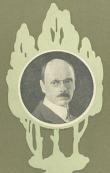Born: Established: 26 Sep 1866 Sydney, New South Wales, ; Died: Ceased: 7 Nov 1951 London,
 6743243041001676361.jpg
6743243041001676361.jpg
Born: Established: 26 Sep 1866 Sydney, New South Wales, ; Died: Ceased: 7 Nov 1951 London,
 6743243041001676361.jpg
6743243041001676361.jpg
George Clutsam's considerable career remains largely unacknowledged in Australia. His creative output and influence on the development of British music theatre are, however, deserving of greater recognition. His reputation among his contemporaries was certainly high. A Times critic once wrote of A Summer Night, for example : 'There was more good music in the hour and a quarter [the opera ran] than in many works at Covent Garden which held the stage from eight to eleven' (qtd. in Eric Irvin, Dictionary of Australian Theatre, p72). The Brisbane Courier reports another London critic's opinion : 'Mr Clutsam's scoring is pointed, fanciful to a degree, picturesque, even humorous when occasion requires, and above all things, it comes off' (2 December 1905, p12).
Clutsam's professional and compositional strengths lay in his ability to collaborate (in the true 'musical' tradition). Several of his more successful productions also required that he re-score accompany pre-existing compositions - as with Lilac Time (Schubert) and The Damask Rose (Chopin) on which he collaborated with Robert and Cicely Courtneidge. It was staged in 1929. It is possible that this has led to his creative role been down-played by critics and historians ignorant of this significant factor in the creation of popular culture music theatre entertainment. Evidence of this view point can be seen in a Times review of the premiere of Lilac Time, which makes no mention his contribution while congratulating Adrian Ross on his adaptation of the work into English (23 Dec 1922, p6). Nevertheless as the Pall Mall Gazette notes in its review of Summer Night, Clutsam at his best displayed a high degree of proficiency in his ability to write 'melodious [and] harmonically fanciful [music which was] married throughout by a thorough and complete attention to detail', and that his 'scoring [shows] an admirable knowledge of true effect' (25 July 1910, p4).
Although largely recognised by his peers for his stage music and light classical works, Clutsam also succeeded in carving out a lucrative career as a popular songsmith - with over 150 published songs to his credit. In addition he wrote a large number of compositions for piano, along with vocal and piano arrangements for his stage compositions. Many of his works were published under the pseudonyms Paul Aubrey, Robert Harrington, H. S. Iseledon, Georges Latouyr and C. G. Mustal. Clutsam was also in demand as a composer for silent films, one of which was Heart's Desire (1937). Despite his reputation as a composer of stage music he never gave up serious composition entirely, however. A suite, The Green Lanes of England, composed in 1920, was another of his more acclaimed art music scores. In retrospect the neglect of Clutsam's contribution to music theatre by his home country is no doubt as a result of his career having been spent almost entirely overseas. Indeed, even the 2001 edition of the New Grove Dictionary of Music and Musicians refers to him as a 'British pianist and composer' (p66).
This entry has been sourced from research undertaken by Dr Clay Djubal into Australian-written popular music theatre (ca. 1850-1930). See also the Australian Variety Theatre Archive